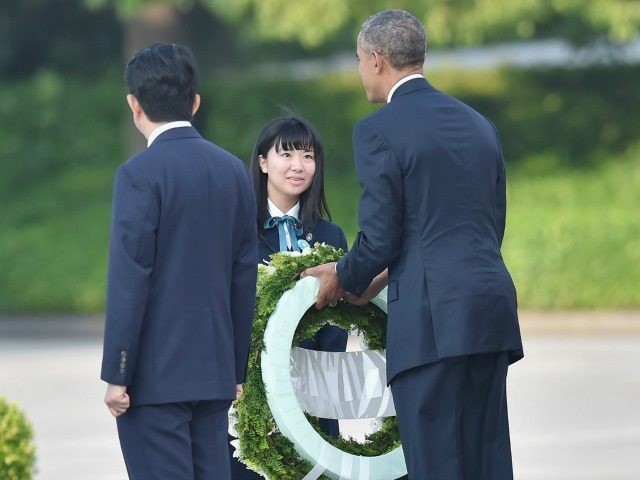Does anyone think it an accident that President Obama chose Memorial Day weekend to give his high-sounding moral equivalence speech in Hiroshima calling for a “moral revolution”?
What Obama proposed in his speech in Japan is moral disarmament, and the consequences of that moral capitulation will be horrific if the world follows his advice.
At Hiroshima, Obama was silent on the question of American sacrifice, American valor, and American virtue, but eloquent on the issue of American guilt.
What Obama did NOT do in his speech in Japan was to praise America’s fallen warriors, the men and women whose bravery and sacrifice saved the world from nuclear war over the 71 years since that first atomic bomb was dropped on Hiroshima in 1945.
Obama is wrong, but if even half of Americans agree with the president, then we have abandoned the meaning of Memorial Day and substituted Atonement Day in its place. And if America’s future leaders think our nation has no further need to honor our fallen warriors, America may discover we have no warriors willing to tread in their path.
Obama’s moral capitulation presents a stark and sobering contrast with the patriotism of a different President, America’s chosen leader only one generation ago. Thirty-two years ago in 1984 Ronald Reagan went to the beaches of Normandy to honor the fallen warriors of many nations who made the ultimate sacrifice to liberate Europe from Nazi tyranny.
The men of Normandy had faith that what they were doing was right, faith that they fought for all humanity….It was a deep knowledge– and pray God we have not lost it — that there is a profound moral difference between the use of force for liberation and the use of force for conquest.
And like every president since the dawn of the atomic age, Reagan was mindful of the terrible destruction that can be unleashed by nuclear weapons. He spoke to that fear on that beach at Pointe du Hoc, France, overlooking a cemetery filled with the graves of American, British, Canadian and French soldiers:
I tell you…we want to wipe from the face of the Earth the terrible weapon that man now has in his hands….And I tell you we are ready to seize that beachhead. We look to the Soviet Union for some sign that they are willing to move forward…there must be a changing there that will allow us to turn our hopes into action.
The difference between Obama’s attitude toward nuclear weapons and Reagan’s attitude is the difference between night and day. That is easy to see. But the deeper question is this: Is it also the difference between two generations? Does Obama’s generation see no evil in the world — and no virtue in America — that would justify the use of those terrible weapons?
The meaning and value of Memorial Day has been lost if Obama’s view of the world is representative of an entire generation. Eight presidents from Truman to Kennedy to Reagan saw the importance of American resolve in confronting evil and possessing the resolve to use whatever force is necessary to defeat evil.
Does Obama’s moral ambivalence on the use of atomic bomb in 1945 speak for America or only for his own peculiar idea of American guilt? We will have to wait five months for the the answer.
But what is not uncertain is that what America needs in confronting the moral evil of radical Islam is moral resolution — the resolve to hold fast to the same moral principles that saved the world from nuclear war over the past 71 years since that fateful day in Hiroshima in 1945.
We can honor our fallen warriors this Memorial Day only by remembering such moral distinctions, not forgetting them as Obama did at Hiroshima.

COMMENTS
Please let us know if you're having issues with commenting.